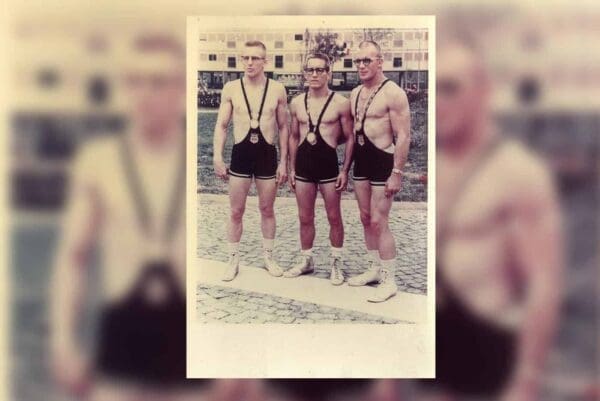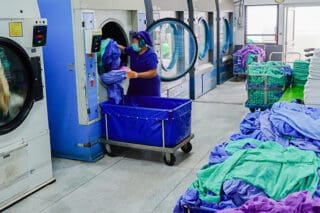
In the world of wrestling, Terry McCann is a legend. In his early wrestling career during college, McCann only lost three matches and went on to win three consecutive AAU National Championships. He also won two NCAA titles during his college career. In 1956, McCann considered joining the Olympic-bound team, though ultimately decided to push back his Olympic goals so he could finish his education.
In 1960, McCann was able to fight back from an injury that nearly excluded him from heading to Rome that summer for the Olympics. After a bit of a rocky start, McCann was able to win the gold medal in the bantamweight division of freestyle wrestling, becoming the only man at the time to be recognized with an undefeated international record. After achieving his Olympic dreams, McCann continued to be lauded in the wrestling world. He pursued his love of wrestling by coaching various other champions and was later inducted into the U.S. Wrestling Hall of Fame, the International Wrestling Hall of Fame, the Amateur Wrestling Hall of Fame, and the United States Olympics Hall of Fame. He also co-founded what is today known as USA Wrestling, the national governing body for wrestling.
In addition to all his wrestling feats, McCann was a loving husband and father, served as the executive director for Toastmasters International, and continued to lead an active lifestyle. But in the midst of all of his success, McCann began to experience symptoms from asbestos exposure that likely occurred before he even reached the Olympic stadium.
Early Symptoms of Mesothelioma
It wasn’t until the early 2000s that McCann began to experience sometimes severe chest pains. He chalked up the symptoms to getting older, as he continued to surf and do his daily workouts. It didn’t seem possible that he’d be facing any severe health problems when much of his life was built around his athleticism and an active lifestyle.
But throughout 2004, McCann suffered from chest pain and shortness of breath that became debilitating at times. He ignored the pains for some time, until it became too much to cope with. He went into the hospital several times and had X-rays and CT scans to try to determine what was causing his chest pain. The doctors were able to explain to McCann that he was suffering from recurrent pleural effusions, buildup of liquid in the lungs, but the cause was unclear. In many cases, pleural effusions can be a symptom of or develop into more serious diseases, like lung cancer or mesothelioma.
After several more rounds of testing, his doctors decided to perform a biopsy of his lung tissue to see if there were any malignant, cancerous cells causing these severe pleural effusions. After over a year of dealing with intensifying symptoms and waiting for answers, McCann and his loved ones learned he was diagnosed with pleural mesothelioma in the spring of 2005.
As they came to terms with his diagnosis, McCann realized he was likely exposed to asbestos back in the 1950s. While he was training for the Olympics, he briefly worked at an oil refinery in Oklahoma. Oil refineries are known for using asbestos, particularly in their equipment and products used to help maintain the machinery. Even though McCann only worked there for a few weeks, even brief, minimal exposure to asbestos is considered dangerous.
Battling Pleural Mesothelioma
Shortly after his diagnosis, McCann started with a standard first-line of treatment with combination chemotherapy. As he went through treatment, his family said he tried to remain active and keep up with workouts. He was an athlete through and through and believed exercise could potentially benefit him more than the treatment itself.
Even while facing the severe symptoms of his disease and intense side effects from treatment, McCann continued to fight for change to help others, much like he did throughout his life with wrestling and his work with Toastmasters International. He realized the dark ways of the asbestos industry and how many innocent victims like himself have faced exposure because of their neglect. He spoke out against the asbestos industry many times, even filming a commercial against a proposed law at the time that would make it difficult for asbestos victims to take legal action against asbestos manufacturers. He became an advocate for fellow asbestos victims, urging the public to reach out to Congress.
Sadly, all of McCann’s efforts came to an abrupt end on June 6, 2006. He passed away from his mesothelioma at 72, about one year after receiving his official diagnosis.
Upon reflecting on McCann’s life and all he accomplished, his brother Fran remembers Terry fondly and how he continues to inspire his loved ones today. “His quote, ‘If you’re ever satisfied, you don’t progress’ reflected the way he lived his life,” Fran said. “The gold medal was his life goal. Becoming a CEO was another life goal. He kept reflecting that idea to me – to keep striving. That’s a belief that I still hold.”
McCann accomplished a lot in his life, refusing to let his terminal mesothelioma diagnosis slow him down. His legacy will live on for his many accomplishments in wrestling and business, as well as his efforts to be a voice for other mesothelioma victims.




